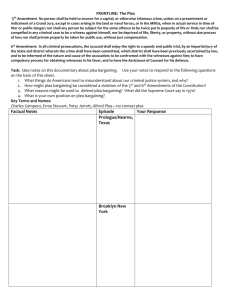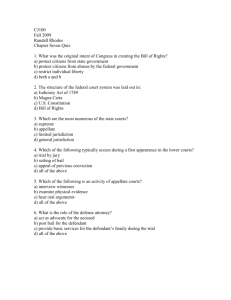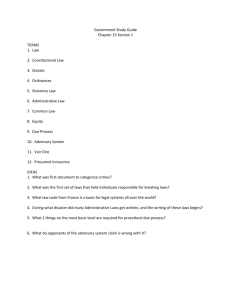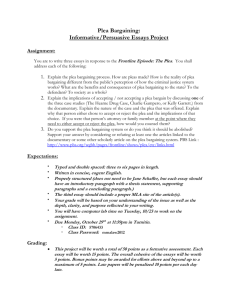Advanced Issues in Criminal Justice Syllabus Spring 2014
advertisement
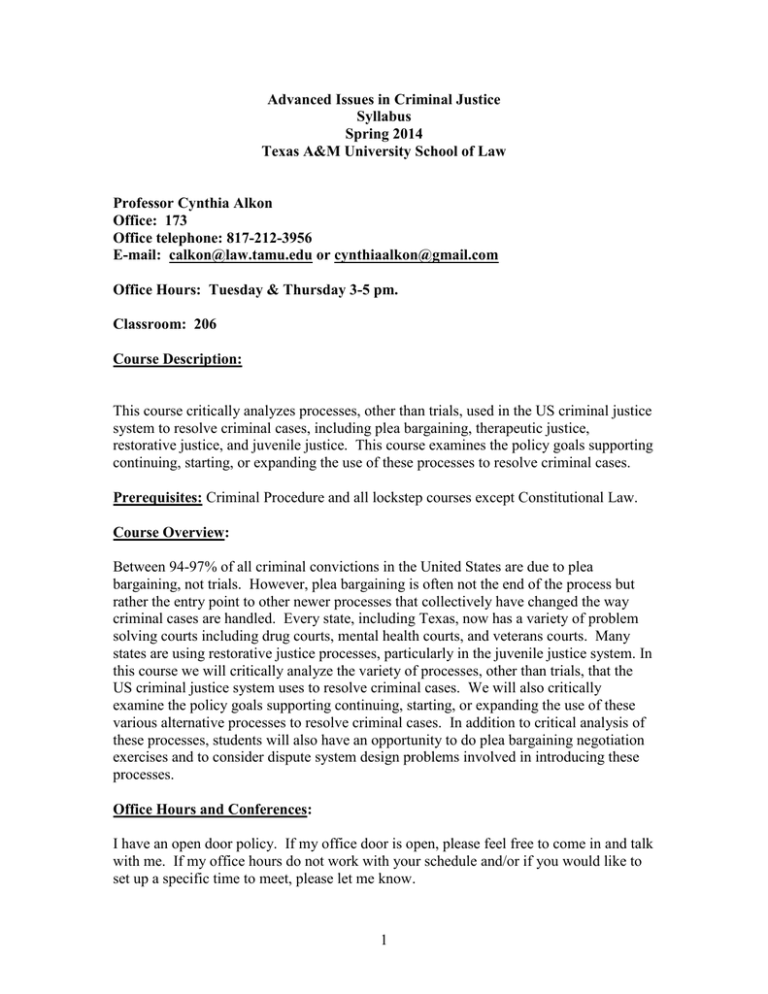
Advanced Issues in Criminal Justice Syllabus Spring 2014 Texas A&M University School of Law Professor Cynthia Alkon Office: 173 Office telephone: 817-212-3956 E-mail: calkon@law.tamu.edu or cynthiaalkon@gmail.com Office Hours: Tuesday & Thursday 3-5 pm. Classroom: 206 Course Description: This course critically analyzes processes, other than trials, used in the US criminal justice system to resolve criminal cases, including plea bargaining, therapeutic justice, restorative justice, and juvenile justice. This course examines the policy goals supporting continuing, starting, or expanding the use of these processes to resolve criminal cases. Prerequisites: Criminal Procedure and all lockstep courses except Constitutional Law. Course Overview: Between 94-97% of all criminal convictions in the United States are due to plea bargaining, not trials. However, plea bargaining is often not the end of the process but rather the entry point to other newer processes that collectively have changed the way criminal cases are handled. Every state, including Texas, now has a variety of problem solving courts including drug courts, mental health courts, and veterans courts. Many states are using restorative justice processes, particularly in the juvenile justice system. In this course we will critically analyze the variety of processes, other than trials, that the US criminal justice system uses to resolve criminal cases. We will also critically examine the policy goals supporting continuing, starting, or expanding the use of these various alternative processes to resolve criminal cases. In addition to critical analysis of these processes, students will also have an opportunity to do plea bargaining negotiation exercises and to consider dispute system design problems involved in introducing these processes. Office Hours and Conferences: I have an open door policy. If my office door is open, please feel free to come in and talk with me. If my office hours do not work with your schedule and/or if you would like to set up a specific time to meet, please let me know. 1 Learning Objectives: By the end of the semester you should 1. Understand the basic rules governing how plea bargaining operates. 2. Understand the variety of alternative processes in the U.S. criminal justice system including plea bargaining, problem solving courts, restorative justice, and juvenile justice. 3. Understand the basic policies and principles surrounding the use of these alternative processes. 4. Be able to do basic dispute system design for introducing a problem solving court or restorative justice process into the court system. 5. Be able to negotiate a basic plea bargain either as a prosecutor or a defense attorney. 6. Be able to advise a client about the advantages or disadvantages of these alternative processes. 7. Understand the advantages and disadvantages of these alternative processes from the perspective of a prosecutor, defense lawyer, judge, and policy-maker. Disability Policy: Texas A&M School of Law adheres to a disability policy that is in keeping with relevant federal law. The law school will provide reasonable accommodations as determined by the Assistant Dean of Student Affairs, Rosalind Jeffers, in consultation with the University’s disability services. Students must notify Dean Jeffers of any permanent or temporary disabilities and must provide documentation regarding those disabilities prior to the granting of an accommodation. Due to the law school’s policy of testing anonymity, students should not discuss their disabilities with professors. For assistance, students should consult with Dean Jeffers. Academic Integrity and Policy: I expect all students to follow the Aggie Honor Code at all times in this class and in any assignments for this class. Under the Aggie Honor Code “An Aggie does not lie, cheat or steal, or tolerate those who do.” You can see the full statement of the honor code and rules and procedures if it is violated on the Texas A & M Law School Website: Law School Honor Policy I will treat any violation of the policy seriously and in a manner that complies with the stated policy 2 Course Web Site: This course will extensively use a course web page created through the LexisNexis Web Course (hereinafter the Web Course). You will find it listed as “Advanced Issues in Criminal Justice.” The syllabus, required reading, and other class materials will be posted to the site. I will also regularly send e-mail messages to the e-mail account that you designate when you register with the LexisNexis Web Course. It is your responsibility to check this account regularly (at least once a week) and to make sure that the account remains functional and to ensure that you have read any messages that I may send to you on that account. Required Reading: All of the reading for this course will be electronic and posted on the Web Course. It is your choice whether you print out hard copies of the reading material. The reading will be listed on the Web Course by the class number (e.g., Class 1, Class 2). Please be aware that I will be changing/editing/improving the reading during the semester, so this one class where I would caution against getting too far ahead. I will explain more about this in class during our first meeting, but, for now, I suggest that you not read more than two weeks in advance. Attendance and Class Participation: You are required to attend all classes. The Law School has a mandatory attendance policy. Pursuant to that policy, any student who misses more than 25% of classes will be withdrawn from the class. Tardy arrivals or early departures may be considered absences. As a significant part of your final course grade (see below) is due to class participation and therefore, class attendance, beyond the minimum required by the Law School, will factor into your final grade. If you miss class on the dates we have guest speakers scheduled, without a valid excuse, you will have points deducted from your final grade. Occasionally, I may need to schedule a make-up class during one of the official make-up times. I will announce the make-up class at least one week in advance. Attendance will be taken at make-up classes. Laptop Computers, Cell Phones & Other Electronic Devices: You will find that this course depends on active participation from everyone. As such, it is important to keep the distractions of electronic devices to a minimum. I allow the use of laptops in this course for the exclusive purpose of having the reading for the day available without requiring you to spend the money to print it out. However, the use of laptops is limited to the reading for the day and taking notes. I will deduct class participation points if you use the laptop to surf the web, do instant messaging, check 3 your Facebook page, or do anything that is unrelated to the two allowed tasks: consulting the reading for the day or taking notes. I reserve the right to revoke the privilege of using laptops in this class for any individual student who violates this policy. And, if it seems to be a widespread problem, I will revoke it for the class as a whole. Any electronic device that allows for audio or visual or any other type of recording is prohibited. Electronic recording of this class, in any way, is prohibited. In addition, you are not allowed to use cell phones in this class unless you have asked me before class and I have given permission for you to use your cell phone on that particular day. I will grant permission only for specific and legitimate reasons. I reserve the right to deduct up to 5 points from your grade each time I see you use a cell phone. I will not give you a warning. The only exception to these policies will be for those with prior permission from the Assistant Dean of Student Affairs. Otherwise your cell phones should be turned off or in silent mode during the class and no recording devices of any kind are allowed. Grading: Your grade in this class will be calculated from a combination of class participation, one oral presentation, and written assignments. You can earn a total of 240 points towards your grade in this class (not including extra credit): Classroom participation: Written Exercise Summaries: Court Observation Writing Assignment: Court Observation Oral Presentation: Other Assignments: 75 points possible 60 points possible 35 points possible 20 points possible 50 points possible 1. Classroom participation: You can earn a total of 75 points for class participation. Grading is based on whether you contribute to classroom discussions; whether that contribution indicates that you have read the assigned material; your active participation during all exercises; and your overall attendance. You will not be graded on the “outcome” of individual negotiations or exercises, but rather by the process you use including whether you suggest creative solutions to the legal and other problems the exercises ask you to solve. You will be graded on how prepared you are (both in terms of doing the readings and preparation for individual exercises). You will also be graded on your improvement over the semester. Throughout the semester you will participate in exercises. Many of these require partnering up in advance of the exercise. Therefore, if you will be absent on any particular day it is your responsibility to notify me as far in advance as possible so alternative assignments can be made. Attendance matters in this class because so much of the learning is experiential, which means you need to be both present and actively participating for a good classroom participation score. 4 2. Exercise Summaries: You can earn a total of 60 points for three written Exercise Summaries. The summaries are due on the days noted below in the syllabus. Each summary must be a minimum of three pages or a maximum of seven pages (in 12 Point Times New Roman, double spaced). Each summary is worth up to twenty points. One point will be deducted for each day the summary is late (beginning at 8:00 pm on the day it is due). The summary must be given in hard copy in class and not sent via email. If you are absent on a day when an exercise is conducted you are required to interview at least three of your classmates about the exercise and write a summary of their experiences and conclusions following the standard exercise summary format. This means you should discuss what they did, what parts of the reading would have been helpful to you (or not) if you had been present for the negotiation, what your classmates learned from the experience and you should also discuss what you have learned from them about what they would do differently and what this means to you regarding how you would approach a similar negotiation in the future. This should also be three to seven pages long. Only one interview summary in lieu of an exercise summary will be accepted during the semester. The required format for the exercise summaries is at the end of this syllabus. 3. Observation of Specialty/Problem Solving Court: You can earn up to 35 points for the Court Observation Summary. The Court Observation Summary is due on March 18, 2014, in hard copy form. One point will be deducted for each day the summary is late (beginning at 8:00 pm on March 18, 2014). As we will discuss in class, both Tarrant County and Dallas County have a full array of problem solving/specialty courts including drug courts, veterans courts, and mental health courts. You will be required to pick one court in any county (you are not limited to Dallas or Tarrant County) and observe one specialty court session. You will need to complete a written Court Observation Summary and turn it in. The required format for the Court Observation is at the end of this syllabus. If your schedule does not allow you to complete a court observation please see me during the first week of class and I will give you an alternate assignment. Please note, I do not consider it to be a scheduling conflict if you do try to do the observation at the last possible moment and then something prevents you from being able to go. One example of a legitimate scheduling conflict is if your job will not allow you to take time off during any of the times the specialty courts meet. Please note: you will need to call in advance to be sure you know when the court meets and to let the judge know that you will be observing. Please try to coordinate with your classmates so whichever court you are interested in is not inundated with calls from this class. We will discuss in class how to coordinate the initial contacts. Some problem solving 5 courts (such as the Prostitution Court in Dallas) are not open courts. If you are told you are not welcome to attend a particular court session, just find out what other court sessions you may be able to attend. Please be sure you plan enough time in advance so that you do not find yourself trying to pull this together at the last minute. In all of your communications with these courts I expect you to be professional and remember that you are representing Texas A&M University School of Law when you contact these courts and attend the court sessions. I will deduct up to 30 points from your final class grade if there are any problems with professionalism in connection with the court observations. If you have any questions about what would, or would not be professional behavior, please ask. A minimum standard of professionalism will include dressing professionally for the court session, not eating or chewing gum in court, being respectful in all communications with anyone connected to the court, and following any instructions you are given in connection with the court observation by the court personnel, the judge, the prosecutor or defense lawyers. You should not have your cell phone on, or any electronics, while in court observing. In many courts doing so will be considered a violation of the rules. In courts that do not have such rules, keeping your electronic devices off is professional and courteous. It is also difficult to observe what is going on in court if you are busy checking your facebook or email. 4. Oral Presentation of Problem Solving Court Observation: You can earn up to a total of 20 points for this oral presentation. The presentations are scheduled for the classes that meet on February 27 and March 4, 2014. Please let me know if you will have a scheduling conflict on either of those days as soon as possible so I can take that into consideration when I assign the presentation dates. I will divide students up for presentation based on the type of court you are observing so that we have, for example, all students observing a drug court present on the same day. The presentations will be done as a panel for each type of court and I will give you a list of questions, in advance, that you should be prepared to answer during the presentation. If you are not prepared to present on the date assigned you will have 10 points deducted from your final score. You are required to dress professionally on the day you are presenting your paper. Failure to dress professionally will result in a 10 point deduction from your final score. 5. Other Assignments: A. Film Review: you can earn up to 30 points for a film review of the Movie Face to Face that you are required to complete and turn in on April 8, 2014. One point will be deducted for each day the summary is late (beginning at 8:00 pm on the day it is due). The film will be available, in DVD, on reserve 6 at the library. You could also rent the film from Amazon “on demand” or from other sources (such as Netflix). See the required format for the review at the end of this Syllabus. Please Note: The film is from Australia and is a dramatized account of one restorative justice process in a criminal assault case, based on actual cases. As a drama, the film includes profanity and some moderate violence. As a foreign film, it is not rated, but is probably the equivalent of an “R” rated film. If you would rather not watch this film due to its content, please let me know during the first week of classes so that I can give you an alternative assignment. B. Juvenile Justice Exercise Analysis: You can earn up to 20 points for your analysis of this exercise. This assignment is the only written assignment that should be turned in via email, and is on April 29. One point will be deducted for each day the summary is late (beginning at 8:00 pm on the day it is due). You will receive more information about this assignment later in the semester. Class Calendar: Please be aware that I have scheduled guest speakers for this class. Our guest speakers are all busy professionals and as such some class topics may need to be rearranged to accommodate their schedules and/or we may have last minute changes if the guest speaker/s scheduled for a particular day needs to cancel. Please be flexible and understanding about these circumstances that will be out of all of our control. I will notify you either in class or via the Web Course of any changes as soon as possible. Please Note: On days that we have guest speakers scheduled, please be sure that you have read the materials for the next class just in case we have a last minute cancellation and will instead cover the material scheduled for the next class. Class 1: January 14: Introduction Required Reading: On the Web Course. Class 2: January 17: Plea Bargaining: The Rules Required Reading: On the Web Course. Required viewing: 7 Watch PBS Frontline “The Plea” available at: http://www.pbs.org/wgbh/pages/frontline/shows/plea/view/ (90 minutes long). Class 3: January 21: Plea Bargaining: Background Required Reading: On the Web Course. In today’s class you will receive your roles for the first plea bargain exercise of the class. If you are absent today you will need to arrange to pick up your role from me personally. Please be aware: students cannot pick up roles for each other. In addition, I will not have office hours or be available on January 23 or 24 as I will be out of town at a conference, so, please be sure you have planned ahead. Class 4: January 23: Plea Bargaining: Negotiation Please Note: There will be no class today. In lieu of class you will be required to complete an out-of class plea bargain. Class 5: January 28:_ Plea Bargaining: Negotiation Debrief Required Reading: On the Web Course. Class 6: January 30: Plea Bargaining: Underlying policy goals Required Reading: On the Web Course. Class 7: February 4: Plea Bargaining: Concerns Required Reading: On the Web Course. Note: Plea Bargain Exercise Summary due today. Class 8: February 6: Plea Bargaining: Negotiation Required Reading: On the Web Course. You will receive your roles for the second plea bargain exercise of the class. If you are absent today you will need to arrange to pick up your role from me personally. Please be aware: students cannot pick up roles for each other. 8 Class 9: February 11: Plea Bargaining: Negotiation & Debrief The plea bargain negotiation will be an in-class exercise today. Class 10: February 13: Plea Bargaining: Reform Required Reading: On the Web Course. Please Note: By today you need to advise me which problem-solving court you intend to observe. I will pass out a sign-up sheet in class. This is so I can assign the dates for your oral presentations as we will have two class periods set aside for those presentations and I want to divide up the presentations by subject matter (for example, having all those who observe a veterans court present on the same day). Class 11: February 18: Problem Solving Courts: Background & Neuroscience Required Reading: On the Web Course. Note: Plea Bargain Exercise Summary due today. Class 12: February 20: Problem Solving Courts: Continued Required Reading on the Web course: Please note, there is no class today, but there is reading that will be useful for both the exercise and your court observations. Please Note: There will be no class today. In lieu of class you will be required to do an out of class observation of a problem solving court. You must have your observation completed, and be prepared to do your oral presentation on it by March 4th. The written observation is due on March 18, 2014. Class 13: February 25: Problem Solving Courts: Problem Solving Courts:Concerns Required Reading: On the Web Course. Class 14: February 27: Problem Solving Courts: Exercise & Debrief Class 15: March 4: Problem Solving Courts: Report on Court Observations Class 16: March 6: Problem Solving Courts: Report on Court Observations 9 Class 17: March 18: Guest Speakers: Tentatively schedule: Tarrant County Judge Panel Note: The written Court Observation Summary is due today. Class 18: March 20: Restorative Justice: History & Approaches Required Reading: On the Web Course. Class 19: March 25: Restorative Justice: Concerns Required Reading: On the Web Course. Note: Your Exercise Summary for the Problem Solving Courts Exercise is due today. Class 20: March 27: Guest Speaker: Tentatively scheduled: Representatives of the Dallas County Public Defender and Tarrant County District Attorney Class 21: April 1: Guest Speaker: Tentatively scheduled: Tarrant County private criminal defense lawyers Class 22: April 3: Restorative Justice: Exercise Please Note: There will be no class today. In lieu of class, and any required reading, you are required to watch the Film Face to Face and write a film review (using the required format at the end of the syllabus). DVD copies of the film will be available to check out from the library (from the reserve section). You could also rent the film from Amazon “on demand” or from other sources (such as Netflix). The film is 1 hour and 27 minutes long, so it is longer than our regularly scheduled class time, but if students want to arrange to start the film early and see it on during our regular class time on April 3rd, please let me know so I can be sure our classroom is reserved starting at 6pm. 10 Class 23: April 8: Juvenile Justice: History & Cases Required Reading: On the Web Course. Note: Film Review due today Class 24: April 10: Juvenile Justice: Plea Bargaining Required Reading: On the Web Course. Class 25: April 15: Juvenile Justice: Restorative Justice Required Reading: On the Web Course. Class 26: April 17: Juvenile Justice: Problem Solving Courts Required Reading: On the Web Course. Class 27:April 22: Juvenile Justice Exercise Class 28: April 24: Juvenile Justice Exercise Debrief Required Reading: On the Web Course. April 29: Your final written analysis for this course, on the Juvenile Justice Exercise, is due today. 11 Negotiation Exercise Summary (20 possible points) Name: Date of Exercise: I. Summary: Describe what happened including the outcomes, if any (2 points). II. Describe how what you did was influenced by the readings. If the readings did not influence or change how you acted during the exercise, explain why. Please cite to specific parts of the assigned reading for this exercise. Note: If reading assigned for the debrief days is relevant to your thinking about how you performed during this exercise, you should cite to it and explain why. Otherwise you should refer to the reading assigned for the particular topic, such as plea bargaining, up to the day you conducted the exercise. (8 points) III. Describe what you would do differently if you had it to do over again and why. (10 points) Note: This summary should be a minimum of 3 pages, and a maximum of 7pages, double spaced, Times New Roman 12 pt. 12 Court Observation Summary (35 possible points) Court Observed: County: Date: Time/duration of observation: I. Basics of the Court: In this section you should describe who is eligible for this court and what the goals of the court are; whether it is pre or post-conviction; what the requirements are for completion; how long this court has been operating; and how many participants have successfully completed it. (5 points) II. Description of Court Proceedings during your observation: Describe what happened in the court while you were observing. Please do not include full names of defendants. (5 points) III. Interviews with Judge, Prosecutor & Defense Lawyer: If possible you should try to talk with the Judge, the Prosecutor and a Defense lawyer while you are at the court. In addition to asking them information about how the court operates, you might also want to ask them about their views of the court, how it compares to what would have happened with these cases and defendants in a standard court or before this court was in operation, and if they see their roles to be any different in the context of the specialty court. (10 points, if you are unable to interview any participant, explain why and list what questions you would have asked and why). IV. Conclusion: You should give you analysis of whether this court seems well run, your views of how the various professionals are doing their jobs, whether this court seems to be achieving its goals, whether you would want to practice in one of these courts as a lawyer (and why or why not), and any other conclusions from the experience. You can add in this section any additional analysis or conclusions you reached due to the class discussion during the Court Observation Reports (15 points) Note: This summary should be a minimum of 5 pages, and a maximum of 10 pages, double spaced, Times New Roman 12 pt. 13 Film Review of Face to Face 30 possible points In writing this review, please keep in mind that in real life this process would probably take a full day to complete and that it was shortened to keep it within the time frame of a film. You should also keep in mind that this film is based on real life experiences and outcomes. I. Describe what happened during the process. (1 point possible). II. Describe the advantages/disadvantages of using this process from a Prosecutor’s perspective, including whether you would have agreed to a plea deal using this process in this case if you were the prosecutor: You should cite to the required reading and draw specific examples from the film. (7 points possible). III. Describe the advantages/disadvantages from a defense lawyer’s perspective, including whether you would have recommended to your client to accept a plea deal using this process if you were the defense lawyer. As a defense lawyer would you have wanted to be present during the restorative justice process? You should cite to the required reading and draw specific examples from the film. (7 points possible). IV. What is your analysis of how the facilitator did his job? What techniques did you observe? What preparation did he seem to do in advance of the restorative justice process? If you were a prosecutor would you want this facilitator to work on cases you prosecute? Why or why not? If you were a defense lawyer would you recommend that your clients accept using this facilitator in the future? Why or why not? You should cite to the required reading and draw specific examples from the film. (8 points possible). V. Based on what you saw in the film, if you had been a participant in this actual restorative justice process, would you recommend to anyone else that they agree to participate in a restorative justice process? Would you answer vary depending on who you were in the film? If yes, why and how? You should cite to the required reading and draw specific examples from the film. (7 points possible). Note: This film review should be a minimum of 4 pages, and a maximum of 8 pages, double spaced, Times New Roman 12 pt. 14
